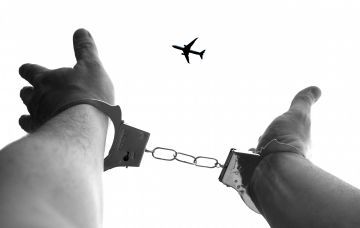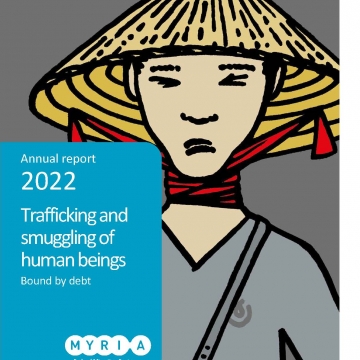Repatriation, detention and deportation
Myria ensures that the human rights of detained foreigners are respected in situations of deportation or re-entry. To achieve this, we have been given access to places where foreign nationals are detained i.e. detention centres and INAD centres (short for “inadmissible”). We also have the right to be informed by the Complaints Commission of any complaint made by a detained foreign national.
Removal Orders
Foreigners who do not or no longer meet the conditions required to legally stay in Belgium may be issued with a removal order from the Immigration Office (ordre de quitter le territoire, OQT). This administrative decision may or may not specify a time-frame in which the foreigner must leave the country, and it may be include a temporary ban from the Schengen area. People who have received OQTs can leave the country voluntarily or via deportation arranged by detention centre authorities.
There are two ways of leaving a country voluntarily:
- Voluntary departure: the person decides on their own initiative, without assistance or the aid of an escort, to leave the country;
- Assisted voluntary departure: the person is assisted and accompanied by organizations such as the Catholic organization Caritas, the international Organization for Migration, or the Immigration Office.
The foreigner who has been ordered to leave the country can also be deported by authorities and held in detention:
- if they are being deported: they are refused entry to Belgium as soon as they arrive at the border;
- if they are arrested in the country while living as an illegal resident and they have failed to comply with the OQT in the set time period or if they were given a OQT with no time allowance.
Deportations can be arranged with or without an escort, depending on whether the foreigner puts up resistance when they leave. When an escort is involved, the process is referred to as forcible return or repatriation. The General Police Inspectorate, both federal and local, is responsible for monitoring the level of force and self-restraint shown by the escorts carrying out the deportation.
Detention facilities for foreigners
As part of processing a foreigner’s deportation, the Immigration Office can detain a foreigner (also referred to as administrative detention) in one of 6 detention centres:
- the Caricole transit centre: located in Melsbroek, next to the Zaventem airport
- the detention centre 127a : located in Steenokkerzeel, next to the Zaventem airport
- the Vottem centre for illegal immigrants
- the Merksplas centre for illegal immigrants
- the Bruges centre for illegal immigrants
- the Holsbeek centre for illegal immigrants
or in an alternative detention facility, referred to as a maison de retour (only if the family has small children).
Note that the Immigration Office can also detain certain types of asylum seekers (foreigners seeking asylum at the border, groups of asylum seekers, asylum seekers subject to the Dublin procedure).
Belgian law provides for the existence of closed centers for foreigners turned away at the border from the regional airports located in Gosselies, Bierset, Deurne, Ostend and Wevelgem. However, these centers have not been used since 2012. A foreigner who is arrested at the border is taken to a closed center after notification, unless there is a flight in the next few hours.

 Publication
Publication
Universal Periodic Review: Parallel report
Parallel report of Myria, Unia and the Combat Poverty, Insecurity and Social Exclusion Service, on the 52nd session of the Universal Periodic Review.
 Publication
Publication
2024 Annual report Trafficking and smuggling of human beings
This annual report, entitled ‘Latin American sex work: a high-risk carousel’, particularly draws attention to the phenomenon of Latin American sex work and calls for the fight against trafficking to be adapted to the new realities of the digital world. These realities are leading to the creation of new, subtle forms of exploitation that require properly adapted investigative resources. Myria is also calling for stronger international collaboration and awareness-raising among the players concerned
_360_360_s_c1.png) Publication
Publication
Gaza Strip: Belgian assistance, evacuations and visa applications
Myria continues to receive reports from Palestinians and Belgians who are deeply concerned about the fate of their relatives trapped in extremely dangerous conditions in Gaza.
 Publication
Publication
2023 Annual report trafficking and smuggling of human beings
Myria is publishing the English version of its 2023 evaluation report, entitled ‘A chain of responsibilities’. With a focus on human trafficking for the purpose of labour exploitation, Myria is calling for more proactive checks and a thorough chain approach.
_360_360_s_c1.png) Publication
Publication
Human rights also apply to single men seeking asylum
8 human rights organisations condemn the decision to temporarily exclude single men from the right to reception within the framework of the asylum procedure.
 Publication
Publication
2022 Annual report trafficking and smuggling of human beings
Myria, the independent national rapporteur on trafficking in human beings, is publishing its 2022 public and independent annual report in English entitled Bound by debt.
